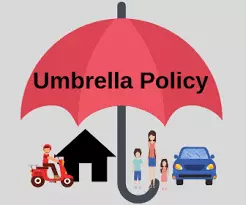
Let us help you understand
Umbrella Insurance
No…. this page is not about insuring your favorite umbrella. However, this is a useful guide that explains what an umbrella insurance policy is and why it is important to have one.
- Umbrella Insurance
- What is a Personal Umbrella Insurance Policy?
- How Does an Umbrella Insurance Policy Work?
- What is Covered by Umbrella Insurance?
- What About the Umbrella Insurance Cost?
- How Much Umbrella Insurance Do I Need?
- What are the disadvantages of umbrella insurance?
- Frequently Asked Questions
- What is umbrella insurance?
- Who needs umbrella insurance?
- How much umbrella insurance should I have?
- INSURANCE SERVICES WE OFFER
Unless you have been in the insurance industry or had an insurance agent or even a financial advisor recommend one, you probably think umbrellas are the things you use when it is raining outside.
While this correct, in umbrella insurance they can help protect you from more than just a rainy afternoon.
What is a Personal Umbrella Insurance Policy?
In the insurance world, personal umbrella insurance is an extra layer of personal liability protection.
Without a too in-depth insurance lesson that will leave you falling asleep in your chair, here is a quick breakdown.
Personal liability is the coverage on your home or auto policy that protects you financially and covers third party injuries.
Umbrella insurance is an additional liability limit that kicks in once your primary limits are exhausted. For additional questions, please feel free to contact us.
How Does an Umbrella Insurance Policy Work?
On a homeowner’s policy, it covers you if someone was on your property and fell down your stairs.
This bucket of money would cover their medical expenses and so on.
Now let’s say you have a pool, and were hosting a party. During this party, your neighbors’ son fell into the pool, drown and had to be care flighted to the hospital.
Your underlying liability coverages of $100,000, $300,000 or even $500,000 would not be enough to cover these expenses, and you would have to make up the difference out of pocket, possibly in a lawsuit.
However, if you had a one million dollar personal umbrella insurance, once you exceed those underlying limits the umbrella would kick in, covering the expenses you may be liable for up to listed policy limit on the umbrella policy declarations page.
The umbrella insurance policy would work the same if you were in a car accident. Most auto limits you see are in increments like $50,000/$100,000/$50,000.
The first number is the amount of liability per person per accident, the second is the limit of liability paid total per accident, and the last number is the amount paid towards property damage.
Let’s say you are driving down the highway, and an unfortunate sneezing attack starts causing you to cross two lanes into oncoming traffic, resulting in a multi-car collision, if you were carrying the above limits, it probably would not be enough to cover everyone that claimed damages.
You may be financially responsible for the remaining balances and most likely find yourself on the wrong end of a lawsuit. However, if you purchased an umbrella policy, you would have another stream of money to fish from to cover those additional injuries.
What is Covered by Umbrella Insurance?
Umbrella insurance serves as an additional layer of protection beyond your standard auto insurance policy, providing comprehensive coverage in various scenarios. This policy is designed to safeguard you from unexpected financial liabilities that may arise in the event of a major accident or lawsuit. One of the primary aspects covered by umbrella insurance is liability protection. In case your auto insurance limits are exceeded due to a severe accident where you are at fault, the umbrella policy steps in to cover the remaining costs, such as medical expenses, legal fees, and damages.
Furthermore, umbrella insurance extends its protective umbrella (pun intended) to a broader spectrum of situations, including defamation lawsuits, libel, and slander claims. It can also cover legal expenses arising from incidents on your property, ensuring a holistic shield against potential financial setbacks. Understanding the coverage details of umbrella insurance is crucial for individuals seeking comprehensive protection, as it not only safeguards your current assets but can also be a financial lifesaver in the face of unforeseen circumstances. Ensure you discuss your unique needs with our expert insurance agents to tailor an umbrella policy that perfectly aligns with your personal and financial circumstances.
What About the Umbrella Insurance Cost?
Now that you have examples of what an umbrella insurance can do, I am sure you are wondering what the catch is. There aren’t many caveats to the umbrella policy.
Claim and driving records are factors but most of the requirements to carry an umbrella insurance policy include an underlying home policy and auto insurance with adequate limits.
The limits necessary depend on the company that the umbrella is written through.
You might think that a million dollars of coverage would be an outrageous premium, but it is not.
The cost is relatively inexpensive; some are only about $380 a year. That is such a small amount to pay for a huge piece of mind. Some companies may package your home, auto, and umbrella together.
How Much Umbrella Insurance Do I Need?
When determining your coverage limits, consider three things:
- The hazards you may face. Examine the risks as a homeowner or renter, the chance of causing an accident during your daily work commute, and any other potentially dangerous activities that could put those around you at risk. Maybe you are an avid boater, causing a boating accident would be something covered under the umbrella policy as well.
- The value of all of your stuff. These assets include properties, possessions, stocks, bonds, savings and retirement funds. The more you have to protect, the higher the umbrella policy limit you should consider.
- Lastly, are you willing to risk future income? Liability lawsuits often result in the loss of both current assets and even future income. Those with few assets now may want to consider the long-term implications of a severe claim.
- When you evaluate your future income, consider your earning potential. You do not have many assets now, but you are on track for a high-paying career, you could be part of a lawsuit that targets future earnings.
Speak with one our licensed insurance agents today to determine any specific risk factors you may have. To learn more about how to protect your current and future assets contact us today.
What are the disadvantages of umbrella insurance?
Umbrella insurance serves as a crucial layer of protection for individuals and families, providing coverage beyond the limits of standard auto insurance policies. While it offers numerous benefits, understanding its potential drawbacks is equally important.
Firstly, umbrella insurance typically requires individuals to maintain certain minimum liability limits on their underlying auto insurance policies. Failure to meet these requirements may result in ineligibility for umbrella coverage. Additionally, umbrella insurance does not cover every type of claim; it primarily focuses on liability claims and may not extend to property damage or personal injury claims not covered by the underlying policies.
Furthermore, umbrella insurance may not provide coverage for intentional acts or certain types of business-related liabilities, necessitating a thorough review of policy exclusions. It’s crucial for policyholders to assess their specific needs and consult with an experienced insurance agent to determine if umbrella insurance is the right choice for them. While it offers significant protection, understanding its limitations is essential to ensure comprehensive coverage.
Moreover, another disadvantage of umbrella insurance lies in its cost implications. While it provides extensive coverage, obtaining umbrella insurance typically requires paying additional premiums. The cost can vary based on factors such as the individual’s risk profile, the limits of coverage desired, and the insurance provider’s pricing structure. Additionally, individuals may need to meet certain eligibility criteria or undergo underwriting scrutiny, which could further affect the overall cost. This expense may deter some individuals from obtaining umbrella insurance, especially if they perceive it as an unnecessary financial burden. However, it’s essential to consider the potential financial repercussions of being underinsured in the event of a liability claim exceeding the limits of standard insurance policies.
Despite the associated costs, for many individuals, the peace of mind and comprehensive protection offered by umbrella insurance outweigh the financial considerations. As with any insurance decision, careful evaluation of individual needs and consultation with a knowledgeable insurance professional can help navigate the complexities of umbrella insurance and make informed decisions to safeguard one’s financial well-being.
Frequently Asked Questions
What is umbrella insurance?
Umbrella insurance is a type of personal liability insurance that covers claims in excess of regular homeowners, auto, or boat insurance policies. This coverage kicks in when the liability on these other policies has been exhausted.
Who needs umbrella insurance?
Umbrella insurance is recommended for individuals who have assets that may be at risk in a lawsuit, or for those who want additional peace of mind knowing they have extra liability coverage. This can include homeowners, car owners, and boat owners who have significant assets or savings.
How much umbrella insurance should I have?
The amount of umbrella insurance you should have depends on your personal assets, your risk profile, and your potential exposure to liability claims. A common starting point is to have at least enough coverage to equal your net worth.
INSURANCE SERVICES WE OFFER

Homeowners Insurance
Homeowners, renters, and mobile home owners: make sure you have the protection you need.



